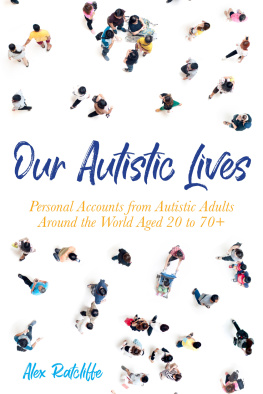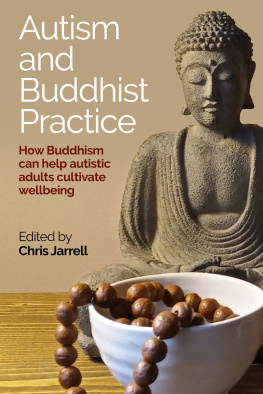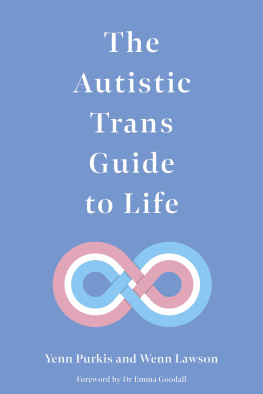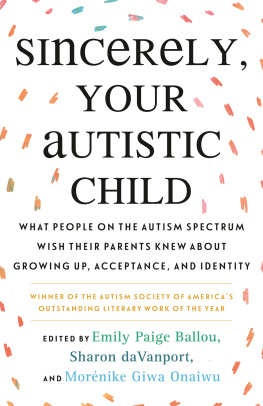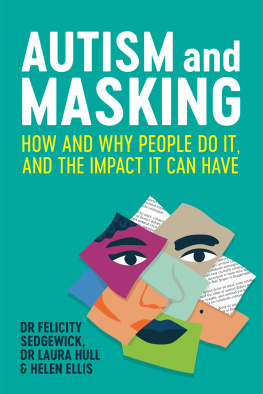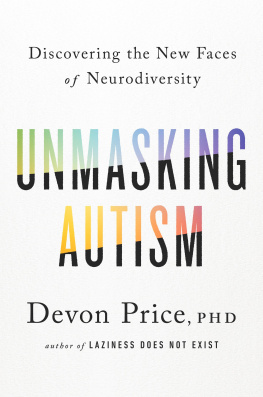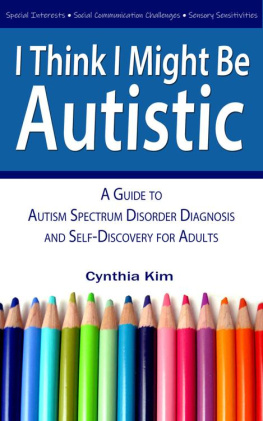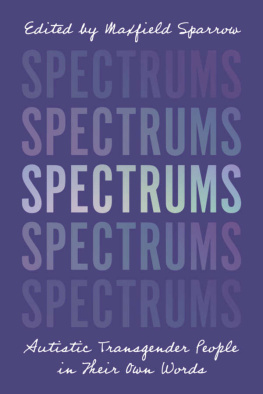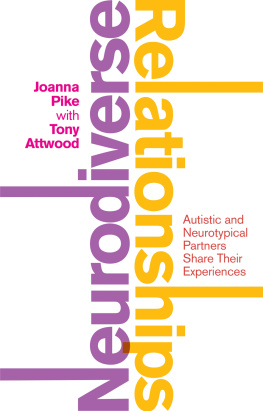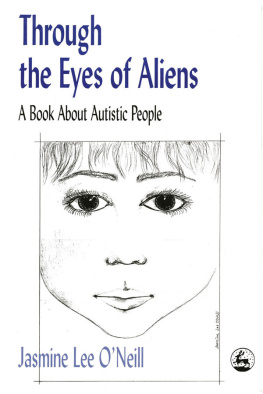
Our Autistic
Lives
_____________
Personal Accounts from Autistic Adults Around the World Aged 20 to 70+
Edited by Alex Ratcliffe

Contents
Introduction
T he autistic community makes up approximately 1% of the worlds population. Many countries report a higher figure, including the USA at 2.2% and Japan at 2.7%. These percentages are from studies conducted post-2004 and many involved only children. They dont take into account those diagnosed as adults, particularly those who have been able to cope and therefore havent been diagnosed until later in life. The true percentages are even higher when you include those who are self-diagnosed or not yet officially diagnosed, such as me.
I want to point out that Im not an expert on autism and that this book isnt about explaining autism or putting my own views across. Instead, its a book about sharing views and experiences from a wide variety of individuals who happen to be autistic. Its a book that I wish Id read many years ago.
It was whilst looking for such a book that I realised it was yet to exist and that the number of books containing shared accounts greatly diminishes as the age of the writer(s) increases. Although older citizens may not have obtained a diagnosis until relatively recently, these citizens still exist, as do their peers without a diagnosis. I believe that in failing to acknowledge the older generations, we are effectively failing to acknowledge a significant proportion of society. The term autism was first described back in the 1920s, yet it wasnt until 1980 (when some of the contributors in this book were already in their 40s) that it started being used as an official diagnosis, separate from schizophrenia. Even then it was still labelled infantile autism and was seen purely as an impairment, not a difference.
The number of people being diagnosed now is rising by up to 30% per country every year. This isnt because of an increase in autism; it is because of an increase in autism awareness. Autism awareness, however, does not mean autism acceptance. Although the worlds understanding of autism has improved over time, statistics show that autism acceptance has a long way to go.
A study by the Karolinska Institute between 1987 and 2009 revealed that 66% of autistic adults had contemplated suicide. This is 39% higher than the neurotypical population. A dominating risk factor of suicide is depression. It is important to point out that autism does not cause depression. But societys lack of understanding can. It can cause autistic people to become more vulnerable to feelings of loneliness, worthlessness and isolation. This book therefore aims to increase the acknowledgement of this segment of society, particularly those in their 50s and beyond. It aims in some small way to reduce those statistics.
The personal accounts you are about to read come from across the generations and across the continents. Youll encounter a range of terms including ASD (autism spectrum disorder), AS (Aspergers syndrome), PDD (pervasive developmental disorder), HFA (high-functioning autism) and PDA (pathological demand avoidance). This is because an individuals particular diagnosis depends on the year and country in which diagnosis occurred. Whereas some countries, including the UK, tend to use the ICD (International Classification of Diseases) to form a foundation for diagnosis, many use the American DSM ( Diagnostic and Statistical Manual ). In 2018, the latest ICD (ICD-11) was published, to take effect from 2022. It runs more in line with the latest DSM (DSM-5) which no longer has Aspergers as a separate diagnosis. Because of the changes within these updated manuals, ASD is likely to become the most commonly given diagnostic term worldwide.
Terminology used also depends on personal preference and belief. For example, many autistic people do not like to add descriptions to the term autistic. They dont want to be known as high-functioning or severely autistic. They dont want to be put in a hierarchy or spectrum, and they dont believe there should be a distinction between themselves and the rest of the autistic population.
I recognise that views on self-diagnosis are mixed. Although the majority of contributions are from those who are officially diagnosed, some are from those who are self-diagnosed. There are a variety of reasons for this, including the fact that in many countries knowledge and understanding of autism is still lacking. In other countries a diagnosis might not be financially viable, and even if it is gained, there may be no support that is easily accessible. This is often the case for older generations in particular who may have spent many decades masking their autism in order to survive in society.
Of course, this book is a collection of accounts by autistic people who are able to put their views across. Im very aware that many autistic people are unable to do this in a way that society recognises or understands. It has been this awareness that has made this introduction difficult to write. I dont want to romanticise autism, but I also dont want to paint it as a negative part of someones identity. Because its not. Whether someone is able to put their views about being autistic across is perhaps less important than whether society is able to listen. I believe that many of the feelings and views within these accounts are held not just by autistic people who are able to recognise them and express them, but by those who cannot do so in a way that society recognises. Whether an autistic individual has a learning disability or not, theyre an important part of society. They always have been.
Hirvikoski, T., Mittendorfer-Rutz, E. and Larsson, H. (2016) Premature mortality in autism spectrum disorder. British Journal of Psychiatry 208 , 3, 232238. A study of 27,000 individuals with an autism spectrum disorder (6400 with an intellectual disability). This study compared those with an autism spectrum disorder with roughly 2,500,000 individuals without an autism spectrum disorder.
Cassidy, S., Bradley, P., Robinson, J., Allison, C., McHugh, M. and Baron-Cohen, S. (2014) Suicidal ideation and suicide plans or attempts in adults with Aspergers syndrome attending a specialist diagnostic clinic: A clinical cohort study. The Lancet: Psychiatry 1 , 2, 142147. A study of 374 individuals who were newly diagnosed with Aspergers between 2004 and 2013.
Our 20s
_______________
Gideon-Sebastian
Advocate
I m a pansexual trans-person. I came out as pan at 18 and trans a few years later. I grew up Catholic but became an atheist at 14. My family arent too happy about my lifestyle choices. I just ignore their views and correct them when they mess up my name and pronouns.
At 21 I did my research and self-diagnosed myself autistic. Up until then Id always felt that I was either some sort of freak or losing my mind. Shortly after my self-diagnosis, I pressured my mother into letting me see an autism specialist to see if what I suspected was true. It took several months to get in to see the doctor and then an additional four appointments that spanned over another several months before I finally, at the age of 22, received the diagnosis of autism spectrum disorder.
Realizing I was autistic helped me tremendously. It gave me great insight into myself and gave me a concrete explanation for my strange behaviors. No longer do I feel like a failure for things that are out of my control.
I greatly prefer identity-first language. My autism is a part of me; its not an accessory to be added or removed at will. It makes me who I am. Its my neurology. Saying person with autism implies that the autism is somehow separate, that it can be taken out, or that its temporary. I dont like the similarity in phrasing to things like I have a cold or I have cancer. Autism is a harmless difference in the brain, not a disease. I am autistic; it is not a negative attribute, its a statement of fact. Autistic is something I am, not something I have.
Next page
